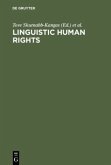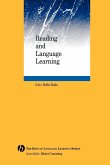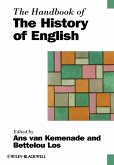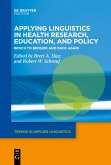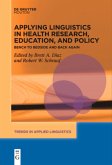William Labov
Principles of Linguistic Change, Volume 3
William Labov
Principles of Linguistic Change, Volume 3
- Broschiertes Buch
- Merkliste
- Auf die Merkliste
- Bewerten Bewerten
- Teilen
- Produkt teilen
- Produkterinnerung
- Produkterinnerung
Written by the world-renowned pioneer in the field of modern sociolinguistics, this volume examines the cognitive and cultural factors responsible for linguistic change, tracing the life history of these developments, from triggering events to driving forces and endpoints. Explores the major insights obtained by combining sociolinguistics with the results of dialect geography on a large scale Examines the cognitive and cultural influences responsible for linguistic change Demonstrates under what conditions dialects diverge from one another Establishes an essential distinction between…mehr
Andere Kunden interessierten sich auch für
![Linguistic Human Rights Linguistic Human Rights]() Mart RannutLinguistic Human Rights44,99 €
Mart RannutLinguistic Human Rights44,99 €![Neoliberalism and Applied Linguistics Neoliberalism and Applied Linguistics]() David BlockNeoliberalism and Applied Linguistics76,99 €
David BlockNeoliberalism and Applied Linguistics76,99 €![Reading and Language Learning Reading and Language Learning]() Keiko KodaReading and Language Learning56,99 €
Keiko KodaReading and Language Learning56,99 €![The Handbook of the History of English The Handbook of the History of English]() The Handbook of the History of English92,99 €
The Handbook of the History of English92,99 €![Applying Linguistics in Health Research, Education, and Policy Applying Linguistics in Health Research, Education, and Policy]() Applying Linguistics in Health Research, Education, and Policy15,99 €
Applying Linguistics in Health Research, Education, and Policy15,99 €![Applying Linguistics in Health Research, Education, and Policy Applying Linguistics in Health Research, Education, and Policy]() Applying Linguistics in Health Research, Education, and Policy134,95 €
Applying Linguistics in Health Research, Education, and Policy134,95 €![Introduction to Pragmatics Introduction to Pragmatics]() Betty J. BirnerIntroduction to Pragmatics51,99 €
Betty J. BirnerIntroduction to Pragmatics51,99 €-
-
-
Written by the world-renowned pioneer in the field of modern sociolinguistics, this volume examines the cognitive and cultural factors responsible for linguistic change, tracing the life history of these developments, from triggering events to driving forces and endpoints.
Explores the major insights obtained by combining sociolinguistics with the results of dialect geography on a large scale
Examines the cognitive and cultural influences responsible for linguistic change
Demonstrates under what conditions dialects diverge from one another
Establishes an essential distinction between transmission within the community and diffusion across communities
Completes Labov's seminal Principles of Linguistic Change trilogy
Hinweis: Dieser Artikel kann nur an eine deutsche Lieferadresse ausgeliefert werden.
Explores the major insights obtained by combining sociolinguistics with the results of dialect geography on a large scale
Examines the cognitive and cultural influences responsible for linguistic change
Demonstrates under what conditions dialects diverge from one another
Establishes an essential distinction between transmission within the community and diffusion across communities
Completes Labov's seminal Principles of Linguistic Change trilogy
Hinweis: Dieser Artikel kann nur an eine deutsche Lieferadresse ausgeliefert werden.
Produktdetails
- Produktdetails
- Language In Society
- Verlag: Wiley & Sons / Wiley-Blackwell
- Artikelnr. des Verlages: 1A405112140
- 1. Auflage
- Seitenzahl: 448
- Erscheinungstermin: 1. November 2010
- Englisch
- Abmessung: 228mm x 153mm x 30mm
- Gewicht: 641g
- ISBN-13: 9781405112147
- ISBN-10: 140511214X
- Artikelnr.: 30589818
- Herstellerkennzeichnung
- Libri GmbH
- Europaallee 1
- 36244 Bad Hersfeld
- gpsr@libri.de
- Language In Society
- Verlag: Wiley & Sons / Wiley-Blackwell
- Artikelnr. des Verlages: 1A405112140
- 1. Auflage
- Seitenzahl: 448
- Erscheinungstermin: 1. November 2010
- Englisch
- Abmessung: 228mm x 153mm x 30mm
- Gewicht: 641g
- ISBN-13: 9781405112147
- ISBN-10: 140511214X
- Artikelnr.: 30589818
- Herstellerkennzeichnung
- Libri GmbH
- Europaallee 1
- 36244 Bad Hersfeld
- gpsr@libri.de
William Labov is Professor of Linguistics and Director of the Linguistics Laboratory, University of Pennsylvania. His major studies include The Social Stratification of English in New York City (1966), Sociolinguistic Patterns (1972), Language in the Inner City (1972), Principles of Linguistic Change: Internal Factors (Wiley-Blackwell, 1994) and Principles of Linguistic Change, Volume 2: Social Factors (Wiley-Blackwell, 2001). With S. Ash and C. Boberg, he published the Atlas of North American English in 2006.
List of Figures.
List of Tables.
Foreword.
Preface.
Abbreviations.
1 Introduction to Cognitive and Cultural Factors in Linguistic Change.
1.1 Cognitive Factors.
1.2 Cultural Factors in Linguistic Change.
1.3 Convergence and Divergence.
1.4 The Darwinian Paradox Revisited.
1.5 Divergence and the Central Dogma.
1.6 The Community Orientation of Language Learning.
1.7 The Argument of this Volume.
1.8 The English Vowel System and the Major Chain Shifts of North American
English.
Part A Cross-Dialectal Comprehension.
2 Natural Misunderstandings.
2.1 The Collection of Natural Misunderstandings.
2.2 Modes of Correction.
2.3 How Common Are Misunderstandings?
2.4 What Is the Role of Sound Change in Misunderstanding?
2.5 The Linguistic Focus of the Misunderstandings.
2.6 The Effect of Mergers.
2.7 Chain Shifts.
2.8 Philadelphia Sound Changes.
2.9 r-less vs r-ful Dialects.
2.10 Sound Changes General to North America.
2.11 An Overview of Natural Misunderstandings.
3 A Controlled Experiment on Vowel Identification.
3.1 The Peterson-Barney Experiment.
3.2 Replicating the Peterson-Barney Experiment.
3.3 Overall Success in Identification.
3.4 Responses to the Chicago Speakers.
3.5 Responses to the Birmingham Speakers.
3.6 Responses to the Philadelphia Speakers.
3.7 Overview.
4 The Gating Experiments.
4.1 Construction of the Gating Experiments.
4.2 Overall Responses to the Gating Experiments.
4.3 Comprehension of the Northern Cities Shift in Chicago.
4.4 Recognition of Chicago Sound Changes in the Word Context.
4.5 The Effect of Lexical Equivalence.
4.6 Comprehension of Southern Sound Changes in Birmingham.
4.7 Comprehension of Philadelphia Sound Changes.
4.8 Overview of the Gating Experiments.
Part B The Life History of Linguistic Change.
5 Triggering Events.
5.1 Bends in the Chain of Causality.
5.2 Causes of the Canadian Shift.
5.3 Causes of the Pittsburgh Shift.
5.4 Causes of the Low Back Merger.
5.5 The Fronting of /uw/.
5.6 The Northern Cities Shift.
5.7 An Overview of Triggering Events.
6 Governing Principles.
6.1 The Constraints Problem.
6.2 The (Ir)Reversibility of Mergers.
6.3 The Geographic Expansion of Mergers in North America.
6.4 Principles Governing Chain Shifts.
6.5 Principles Governing Chain Shifting within Subsystems.
6.6 How Well Do Governing Principles Govern?
7 Forks in the Road.
7.1 The Concept of Forks in the Road.
7.2 The Two-Stage Model of Dialect Divergence.
7.3 The Fronting and Backing of Short a.
7.4 Divergent Development of the /o/ ~ /oh/ Opposition.
8 Divergence.
8.1 Continuous and Discrete Boundaries.
8.2 The North/Midland Boundary.
8.3 Communication across the North/Midland Boundary.
8.4 The Two-Step Mechanism of Divergence.
8.5 Unidirectional Change: The Low Back Merger.
8.6 Consequences of the Low Back Merger for the English Vowel System.
8.7 Resistance to the Low Back Merger.
8.8 Further Differentiation by Chain Shifts.
8.9 A General View of Linguistic Divergence in North America.
9 Driving Forces.
9.1 The Importation of Norms.
9.2 Locality.
9.3 Social Networks and Communities of Practice.
9.4 Socioeconomic Classes.
9.5 Acts of Identity.
9.6 The Relation of Social Classes in Apparent Time.
9.7 Gender as a Social Force.
9.8 The Regional Dialect.
9.9 Accounting for the Uniform Progress of the Northern Cities Shift.
10 Yankee Cultural Imperialism and the Northern Cities Shift.
10.1 The North/Midland Boundary.
10.2 The History of the North/Midland Boundary.
10.3 The Material Basis of the North/Midland Opposition.
10.4 The Cultural Opposition of Yankees and Upland Southerners.
10.5 Coincidence with Geographic Boundaries of Political Cultures.
10.6 Red States, Blue States, and the Northern Dialect Region.
10.7 Relation of Dialects to County Voting Patterns.
10.8 The History of the Death Penalty.
10.9 Ideological Oppositions in the North.
10.10 The Geographic Transformation.
11 Social Evaluation of the Northern Cities Shift.
11.1 The North/Midland Experiment 1.
11.2 Conclusion.
12 Endpoints.
12.1 Skewness as an Index of Approach to Endpoint.
12.2 Social Characteristics of Endpoints.
12.3 The Eckert Progression as the Product of Re-Analysis by Language
Learners.
Part C The Unit of Linguistic Change.
13 Words Floating on the Surface of Sound Change.
13.1 The Issues Reviewed.
13.2 The Fronting of /uw/.
13.3 The Fronting of /ow/.
13.4 Homonyms.
13.5 The Raising and Fronting of /æ/ in the Inland North.
13.6 Overview.
13.7 Participation in Sound Change.
13.8 The Modular Separation of Phonological and Social Factors.
13.9 Conclusion.
14 The Binding Force in Segmental Phonology.
14.1 Is There Allophonic Chain Shifting before Nasals?
14.2 Allophonic Chain Shifting in the Southern Shift?
14.3 The Binding Force.
Part D Transmission and Diffusion.
15 The Diffusion of Language from Place to Place.
15.1 Family-Tree and Wave Models of Change.
15.2 Defining Transmission and Diffusion.
15.3 Structural Diffusion.
15.4 Accounting for the Difference between Transmission and Diffusion.
15.5 Diffusion in Dialect Geography.
15.6 The Diffusion of the NYC Short-a System.
15.7 The Transmission and Diffusion of Mergers and Splits.
15.8 Diffusion of the Northern Cities Shift.
15.9 The Social Context of Transmission and Diffusion.
15.10 Prospectus.
16 The Diffusion of Language from Group to Group.
16.1 Diffusion to the AAVE Community.
16.2 Influence of Surrounding Dialects on AAVE Pronunciation.
16.3 The Diffusion of Constraints on -t, d Deletion to Children in Minority
Communities.
16.4 The Diffusion of Grammatical Variables to Adult Members of the
African-American Community.
16.5 Directions of Diffusion in the Latino Community.
16.6 The Nature of Diffusion across Communal Boundaries.
17 Conclusion.
17.1 Summary of the Argument.
17.2 The Relation of Linguistic Change to Animal Systems of Communication.
17.3 More on the Functions of Language.
17.4 Social Intelligence and Object-Oriented Intelligence.
Notes.
References.
Index.
List of Tables.
Foreword.
Preface.
Abbreviations.
1 Introduction to Cognitive and Cultural Factors in Linguistic Change.
1.1 Cognitive Factors.
1.2 Cultural Factors in Linguistic Change.
1.3 Convergence and Divergence.
1.4 The Darwinian Paradox Revisited.
1.5 Divergence and the Central Dogma.
1.6 The Community Orientation of Language Learning.
1.7 The Argument of this Volume.
1.8 The English Vowel System and the Major Chain Shifts of North American
English.
Part A Cross-Dialectal Comprehension.
2 Natural Misunderstandings.
2.1 The Collection of Natural Misunderstandings.
2.2 Modes of Correction.
2.3 How Common Are Misunderstandings?
2.4 What Is the Role of Sound Change in Misunderstanding?
2.5 The Linguistic Focus of the Misunderstandings.
2.6 The Effect of Mergers.
2.7 Chain Shifts.
2.8 Philadelphia Sound Changes.
2.9 r-less vs r-ful Dialects.
2.10 Sound Changes General to North America.
2.11 An Overview of Natural Misunderstandings.
3 A Controlled Experiment on Vowel Identification.
3.1 The Peterson-Barney Experiment.
3.2 Replicating the Peterson-Barney Experiment.
3.3 Overall Success in Identification.
3.4 Responses to the Chicago Speakers.
3.5 Responses to the Birmingham Speakers.
3.6 Responses to the Philadelphia Speakers.
3.7 Overview.
4 The Gating Experiments.
4.1 Construction of the Gating Experiments.
4.2 Overall Responses to the Gating Experiments.
4.3 Comprehension of the Northern Cities Shift in Chicago.
4.4 Recognition of Chicago Sound Changes in the Word Context.
4.5 The Effect of Lexical Equivalence.
4.6 Comprehension of Southern Sound Changes in Birmingham.
4.7 Comprehension of Philadelphia Sound Changes.
4.8 Overview of the Gating Experiments.
Part B The Life History of Linguistic Change.
5 Triggering Events.
5.1 Bends in the Chain of Causality.
5.2 Causes of the Canadian Shift.
5.3 Causes of the Pittsburgh Shift.
5.4 Causes of the Low Back Merger.
5.5 The Fronting of /uw/.
5.6 The Northern Cities Shift.
5.7 An Overview of Triggering Events.
6 Governing Principles.
6.1 The Constraints Problem.
6.2 The (Ir)Reversibility of Mergers.
6.3 The Geographic Expansion of Mergers in North America.
6.4 Principles Governing Chain Shifts.
6.5 Principles Governing Chain Shifting within Subsystems.
6.6 How Well Do Governing Principles Govern?
7 Forks in the Road.
7.1 The Concept of Forks in the Road.
7.2 The Two-Stage Model of Dialect Divergence.
7.3 The Fronting and Backing of Short a.
7.4 Divergent Development of the /o/ ~ /oh/ Opposition.
8 Divergence.
8.1 Continuous and Discrete Boundaries.
8.2 The North/Midland Boundary.
8.3 Communication across the North/Midland Boundary.
8.4 The Two-Step Mechanism of Divergence.
8.5 Unidirectional Change: The Low Back Merger.
8.6 Consequences of the Low Back Merger for the English Vowel System.
8.7 Resistance to the Low Back Merger.
8.8 Further Differentiation by Chain Shifts.
8.9 A General View of Linguistic Divergence in North America.
9 Driving Forces.
9.1 The Importation of Norms.
9.2 Locality.
9.3 Social Networks and Communities of Practice.
9.4 Socioeconomic Classes.
9.5 Acts of Identity.
9.6 The Relation of Social Classes in Apparent Time.
9.7 Gender as a Social Force.
9.8 The Regional Dialect.
9.9 Accounting for the Uniform Progress of the Northern Cities Shift.
10 Yankee Cultural Imperialism and the Northern Cities Shift.
10.1 The North/Midland Boundary.
10.2 The History of the North/Midland Boundary.
10.3 The Material Basis of the North/Midland Opposition.
10.4 The Cultural Opposition of Yankees and Upland Southerners.
10.5 Coincidence with Geographic Boundaries of Political Cultures.
10.6 Red States, Blue States, and the Northern Dialect Region.
10.7 Relation of Dialects to County Voting Patterns.
10.8 The History of the Death Penalty.
10.9 Ideological Oppositions in the North.
10.10 The Geographic Transformation.
11 Social Evaluation of the Northern Cities Shift.
11.1 The North/Midland Experiment 1.
11.2 Conclusion.
12 Endpoints.
12.1 Skewness as an Index of Approach to Endpoint.
12.2 Social Characteristics of Endpoints.
12.3 The Eckert Progression as the Product of Re-Analysis by Language
Learners.
Part C The Unit of Linguistic Change.
13 Words Floating on the Surface of Sound Change.
13.1 The Issues Reviewed.
13.2 The Fronting of /uw/.
13.3 The Fronting of /ow/.
13.4 Homonyms.
13.5 The Raising and Fronting of /æ/ in the Inland North.
13.6 Overview.
13.7 Participation in Sound Change.
13.8 The Modular Separation of Phonological and Social Factors.
13.9 Conclusion.
14 The Binding Force in Segmental Phonology.
14.1 Is There Allophonic Chain Shifting before Nasals?
14.2 Allophonic Chain Shifting in the Southern Shift?
14.3 The Binding Force.
Part D Transmission and Diffusion.
15 The Diffusion of Language from Place to Place.
15.1 Family-Tree and Wave Models of Change.
15.2 Defining Transmission and Diffusion.
15.3 Structural Diffusion.
15.4 Accounting for the Difference between Transmission and Diffusion.
15.5 Diffusion in Dialect Geography.
15.6 The Diffusion of the NYC Short-a System.
15.7 The Transmission and Diffusion of Mergers and Splits.
15.8 Diffusion of the Northern Cities Shift.
15.9 The Social Context of Transmission and Diffusion.
15.10 Prospectus.
16 The Diffusion of Language from Group to Group.
16.1 Diffusion to the AAVE Community.
16.2 Influence of Surrounding Dialects on AAVE Pronunciation.
16.3 The Diffusion of Constraints on -t, d Deletion to Children in Minority
Communities.
16.4 The Diffusion of Grammatical Variables to Adult Members of the
African-American Community.
16.5 Directions of Diffusion in the Latino Community.
16.6 The Nature of Diffusion across Communal Boundaries.
17 Conclusion.
17.1 Summary of the Argument.
17.2 The Relation of Linguistic Change to Animal Systems of Communication.
17.3 More on the Functions of Language.
17.4 Social Intelligence and Object-Oriented Intelligence.
Notes.
References.
Index.
List of Figures.
List of Tables.
Foreword.
Preface.
Abbreviations.
1 Introduction to Cognitive and Cultural Factors in Linguistic Change.
1.1 Cognitive Factors.
1.2 Cultural Factors in Linguistic Change.
1.3 Convergence and Divergence.
1.4 The Darwinian Paradox Revisited.
1.5 Divergence and the Central Dogma.
1.6 The Community Orientation of Language Learning.
1.7 The Argument of this Volume.
1.8 The English Vowel System and the Major Chain Shifts of North American
English.
Part A Cross-Dialectal Comprehension.
2 Natural Misunderstandings.
2.1 The Collection of Natural Misunderstandings.
2.2 Modes of Correction.
2.3 How Common Are Misunderstandings?
2.4 What Is the Role of Sound Change in Misunderstanding?
2.5 The Linguistic Focus of the Misunderstandings.
2.6 The Effect of Mergers.
2.7 Chain Shifts.
2.8 Philadelphia Sound Changes.
2.9 r-less vs r-ful Dialects.
2.10 Sound Changes General to North America.
2.11 An Overview of Natural Misunderstandings.
3 A Controlled Experiment on Vowel Identification.
3.1 The Peterson-Barney Experiment.
3.2 Replicating the Peterson-Barney Experiment.
3.3 Overall Success in Identification.
3.4 Responses to the Chicago Speakers.
3.5 Responses to the Birmingham Speakers.
3.6 Responses to the Philadelphia Speakers.
3.7 Overview.
4 The Gating Experiments.
4.1 Construction of the Gating Experiments.
4.2 Overall Responses to the Gating Experiments.
4.3 Comprehension of the Northern Cities Shift in Chicago.
4.4 Recognition of Chicago Sound Changes in the Word Context.
4.5 The Effect of Lexical Equivalence.
4.6 Comprehension of Southern Sound Changes in Birmingham.
4.7 Comprehension of Philadelphia Sound Changes.
4.8 Overview of the Gating Experiments.
Part B The Life History of Linguistic Change.
5 Triggering Events.
5.1 Bends in the Chain of Causality.
5.2 Causes of the Canadian Shift.
5.3 Causes of the Pittsburgh Shift.
5.4 Causes of the Low Back Merger.
5.5 The Fronting of /uw/.
5.6 The Northern Cities Shift.
5.7 An Overview of Triggering Events.
6 Governing Principles.
6.1 The Constraints Problem.
6.2 The (Ir)Reversibility of Mergers.
6.3 The Geographic Expansion of Mergers in North America.
6.4 Principles Governing Chain Shifts.
6.5 Principles Governing Chain Shifting within Subsystems.
6.6 How Well Do Governing Principles Govern?
7 Forks in the Road.
7.1 The Concept of Forks in the Road.
7.2 The Two-Stage Model of Dialect Divergence.
7.3 The Fronting and Backing of Short a.
7.4 Divergent Development of the /o/ ~ /oh/ Opposition.
8 Divergence.
8.1 Continuous and Discrete Boundaries.
8.2 The North/Midland Boundary.
8.3 Communication across the North/Midland Boundary.
8.4 The Two-Step Mechanism of Divergence.
8.5 Unidirectional Change: The Low Back Merger.
8.6 Consequences of the Low Back Merger for the English Vowel System.
8.7 Resistance to the Low Back Merger.
8.8 Further Differentiation by Chain Shifts.
8.9 A General View of Linguistic Divergence in North America.
9 Driving Forces.
9.1 The Importation of Norms.
9.2 Locality.
9.3 Social Networks and Communities of Practice.
9.4 Socioeconomic Classes.
9.5 Acts of Identity.
9.6 The Relation of Social Classes in Apparent Time.
9.7 Gender as a Social Force.
9.8 The Regional Dialect.
9.9 Accounting for the Uniform Progress of the Northern Cities Shift.
10 Yankee Cultural Imperialism and the Northern Cities Shift.
10.1 The North/Midland Boundary.
10.2 The History of the North/Midland Boundary.
10.3 The Material Basis of the North/Midland Opposition.
10.4 The Cultural Opposition of Yankees and Upland Southerners.
10.5 Coincidence with Geographic Boundaries of Political Cultures.
10.6 Red States, Blue States, and the Northern Dialect Region.
10.7 Relation of Dialects to County Voting Patterns.
10.8 The History of the Death Penalty.
10.9 Ideological Oppositions in the North.
10.10 The Geographic Transformation.
11 Social Evaluation of the Northern Cities Shift.
11.1 The North/Midland Experiment 1.
11.2 Conclusion.
12 Endpoints.
12.1 Skewness as an Index of Approach to Endpoint.
12.2 Social Characteristics of Endpoints.
12.3 The Eckert Progression as the Product of Re-Analysis by Language
Learners.
Part C The Unit of Linguistic Change.
13 Words Floating on the Surface of Sound Change.
13.1 The Issues Reviewed.
13.2 The Fronting of /uw/.
13.3 The Fronting of /ow/.
13.4 Homonyms.
13.5 The Raising and Fronting of /æ/ in the Inland North.
13.6 Overview.
13.7 Participation in Sound Change.
13.8 The Modular Separation of Phonological and Social Factors.
13.9 Conclusion.
14 The Binding Force in Segmental Phonology.
14.1 Is There Allophonic Chain Shifting before Nasals?
14.2 Allophonic Chain Shifting in the Southern Shift?
14.3 The Binding Force.
Part D Transmission and Diffusion.
15 The Diffusion of Language from Place to Place.
15.1 Family-Tree and Wave Models of Change.
15.2 Defining Transmission and Diffusion.
15.3 Structural Diffusion.
15.4 Accounting for the Difference between Transmission and Diffusion.
15.5 Diffusion in Dialect Geography.
15.6 The Diffusion of the NYC Short-a System.
15.7 The Transmission and Diffusion of Mergers and Splits.
15.8 Diffusion of the Northern Cities Shift.
15.9 The Social Context of Transmission and Diffusion.
15.10 Prospectus.
16 The Diffusion of Language from Group to Group.
16.1 Diffusion to the AAVE Community.
16.2 Influence of Surrounding Dialects on AAVE Pronunciation.
16.3 The Diffusion of Constraints on -t, d Deletion to Children in Minority
Communities.
16.4 The Diffusion of Grammatical Variables to Adult Members of the
African-American Community.
16.5 Directions of Diffusion in the Latino Community.
16.6 The Nature of Diffusion across Communal Boundaries.
17 Conclusion.
17.1 Summary of the Argument.
17.2 The Relation of Linguistic Change to Animal Systems of Communication.
17.3 More on the Functions of Language.
17.4 Social Intelligence and Object-Oriented Intelligence.
Notes.
References.
Index.
List of Tables.
Foreword.
Preface.
Abbreviations.
1 Introduction to Cognitive and Cultural Factors in Linguistic Change.
1.1 Cognitive Factors.
1.2 Cultural Factors in Linguistic Change.
1.3 Convergence and Divergence.
1.4 The Darwinian Paradox Revisited.
1.5 Divergence and the Central Dogma.
1.6 The Community Orientation of Language Learning.
1.7 The Argument of this Volume.
1.8 The English Vowel System and the Major Chain Shifts of North American
English.
Part A Cross-Dialectal Comprehension.
2 Natural Misunderstandings.
2.1 The Collection of Natural Misunderstandings.
2.2 Modes of Correction.
2.3 How Common Are Misunderstandings?
2.4 What Is the Role of Sound Change in Misunderstanding?
2.5 The Linguistic Focus of the Misunderstandings.
2.6 The Effect of Mergers.
2.7 Chain Shifts.
2.8 Philadelphia Sound Changes.
2.9 r-less vs r-ful Dialects.
2.10 Sound Changes General to North America.
2.11 An Overview of Natural Misunderstandings.
3 A Controlled Experiment on Vowel Identification.
3.1 The Peterson-Barney Experiment.
3.2 Replicating the Peterson-Barney Experiment.
3.3 Overall Success in Identification.
3.4 Responses to the Chicago Speakers.
3.5 Responses to the Birmingham Speakers.
3.6 Responses to the Philadelphia Speakers.
3.7 Overview.
4 The Gating Experiments.
4.1 Construction of the Gating Experiments.
4.2 Overall Responses to the Gating Experiments.
4.3 Comprehension of the Northern Cities Shift in Chicago.
4.4 Recognition of Chicago Sound Changes in the Word Context.
4.5 The Effect of Lexical Equivalence.
4.6 Comprehension of Southern Sound Changes in Birmingham.
4.7 Comprehension of Philadelphia Sound Changes.
4.8 Overview of the Gating Experiments.
Part B The Life History of Linguistic Change.
5 Triggering Events.
5.1 Bends in the Chain of Causality.
5.2 Causes of the Canadian Shift.
5.3 Causes of the Pittsburgh Shift.
5.4 Causes of the Low Back Merger.
5.5 The Fronting of /uw/.
5.6 The Northern Cities Shift.
5.7 An Overview of Triggering Events.
6 Governing Principles.
6.1 The Constraints Problem.
6.2 The (Ir)Reversibility of Mergers.
6.3 The Geographic Expansion of Mergers in North America.
6.4 Principles Governing Chain Shifts.
6.5 Principles Governing Chain Shifting within Subsystems.
6.6 How Well Do Governing Principles Govern?
7 Forks in the Road.
7.1 The Concept of Forks in the Road.
7.2 The Two-Stage Model of Dialect Divergence.
7.3 The Fronting and Backing of Short a.
7.4 Divergent Development of the /o/ ~ /oh/ Opposition.
8 Divergence.
8.1 Continuous and Discrete Boundaries.
8.2 The North/Midland Boundary.
8.3 Communication across the North/Midland Boundary.
8.4 The Two-Step Mechanism of Divergence.
8.5 Unidirectional Change: The Low Back Merger.
8.6 Consequences of the Low Back Merger for the English Vowel System.
8.7 Resistance to the Low Back Merger.
8.8 Further Differentiation by Chain Shifts.
8.9 A General View of Linguistic Divergence in North America.
9 Driving Forces.
9.1 The Importation of Norms.
9.2 Locality.
9.3 Social Networks and Communities of Practice.
9.4 Socioeconomic Classes.
9.5 Acts of Identity.
9.6 The Relation of Social Classes in Apparent Time.
9.7 Gender as a Social Force.
9.8 The Regional Dialect.
9.9 Accounting for the Uniform Progress of the Northern Cities Shift.
10 Yankee Cultural Imperialism and the Northern Cities Shift.
10.1 The North/Midland Boundary.
10.2 The History of the North/Midland Boundary.
10.3 The Material Basis of the North/Midland Opposition.
10.4 The Cultural Opposition of Yankees and Upland Southerners.
10.5 Coincidence with Geographic Boundaries of Political Cultures.
10.6 Red States, Blue States, and the Northern Dialect Region.
10.7 Relation of Dialects to County Voting Patterns.
10.8 The History of the Death Penalty.
10.9 Ideological Oppositions in the North.
10.10 The Geographic Transformation.
11 Social Evaluation of the Northern Cities Shift.
11.1 The North/Midland Experiment 1.
11.2 Conclusion.
12 Endpoints.
12.1 Skewness as an Index of Approach to Endpoint.
12.2 Social Characteristics of Endpoints.
12.3 The Eckert Progression as the Product of Re-Analysis by Language
Learners.
Part C The Unit of Linguistic Change.
13 Words Floating on the Surface of Sound Change.
13.1 The Issues Reviewed.
13.2 The Fronting of /uw/.
13.3 The Fronting of /ow/.
13.4 Homonyms.
13.5 The Raising and Fronting of /æ/ in the Inland North.
13.6 Overview.
13.7 Participation in Sound Change.
13.8 The Modular Separation of Phonological and Social Factors.
13.9 Conclusion.
14 The Binding Force in Segmental Phonology.
14.1 Is There Allophonic Chain Shifting before Nasals?
14.2 Allophonic Chain Shifting in the Southern Shift?
14.3 The Binding Force.
Part D Transmission and Diffusion.
15 The Diffusion of Language from Place to Place.
15.1 Family-Tree and Wave Models of Change.
15.2 Defining Transmission and Diffusion.
15.3 Structural Diffusion.
15.4 Accounting for the Difference between Transmission and Diffusion.
15.5 Diffusion in Dialect Geography.
15.6 The Diffusion of the NYC Short-a System.
15.7 The Transmission and Diffusion of Mergers and Splits.
15.8 Diffusion of the Northern Cities Shift.
15.9 The Social Context of Transmission and Diffusion.
15.10 Prospectus.
16 The Diffusion of Language from Group to Group.
16.1 Diffusion to the AAVE Community.
16.2 Influence of Surrounding Dialects on AAVE Pronunciation.
16.3 The Diffusion of Constraints on -t, d Deletion to Children in Minority
Communities.
16.4 The Diffusion of Grammatical Variables to Adult Members of the
African-American Community.
16.5 Directions of Diffusion in the Latino Community.
16.6 The Nature of Diffusion across Communal Boundaries.
17 Conclusion.
17.1 Summary of the Argument.
17.2 The Relation of Linguistic Change to Animal Systems of Communication.
17.3 More on the Functions of Language.
17.4 Social Intelligence and Object-Oriented Intelligence.
Notes.
References.
Index.


